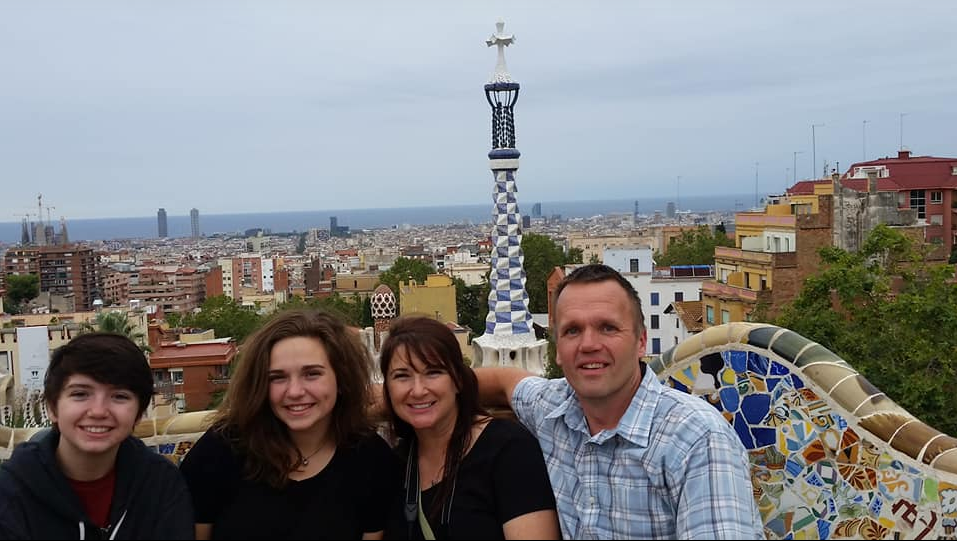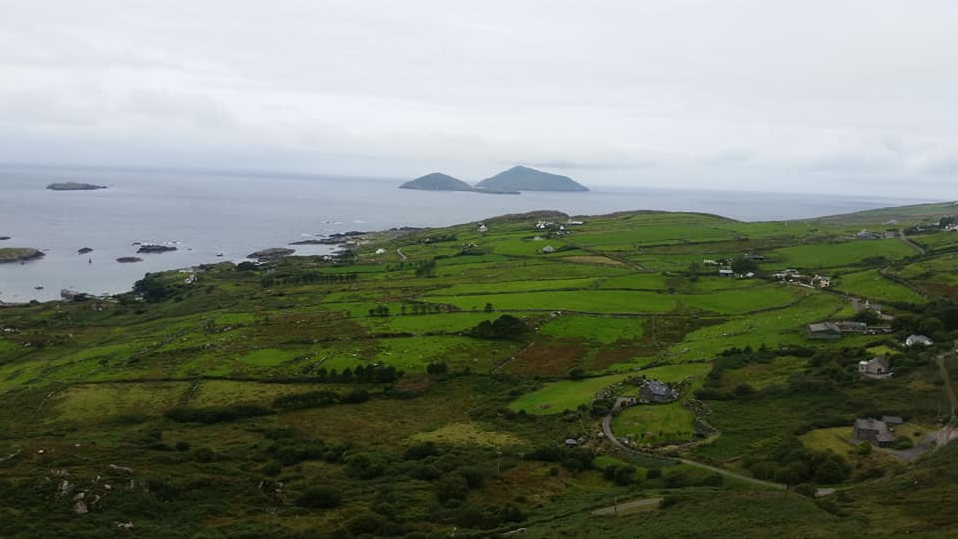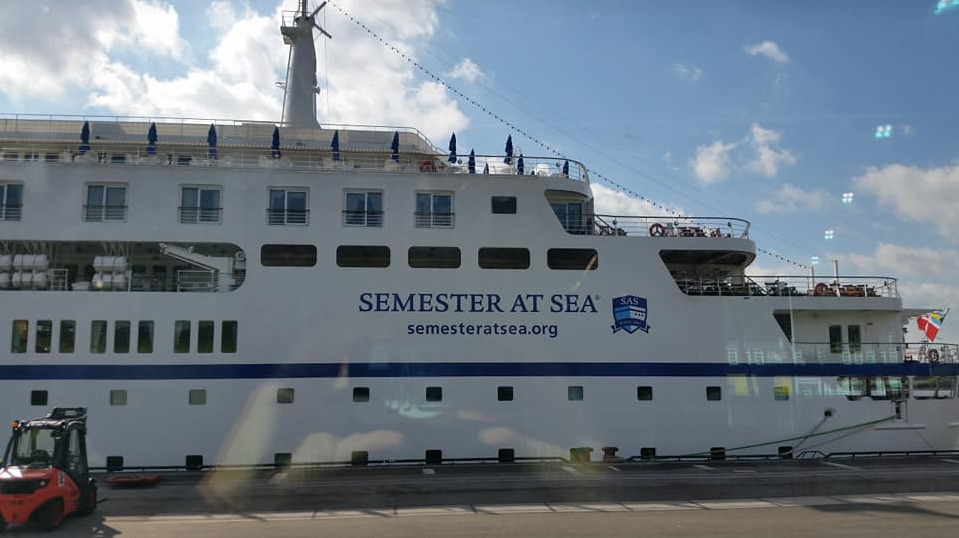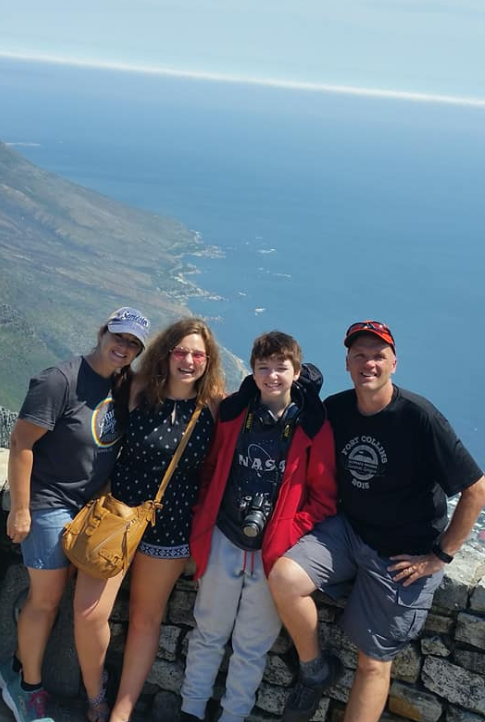




Living on a boat . . . travelling the world . . . and having your family along with you– could anything be better? When Brian Butki heard about Semester at Sea he jumped at the chance to give his family the experience of a lifetime. Butki, a senior teaching assistant professor for the Colorado State University Department of Health and Exercise Science, describes his experience so far:
How and why did you decide to go on Semester at Sea?

I studied abroad when I was in high school, and Semester at Sea was always intriguing to me. I love the idea of visiting many countries for a few days each, and I enjoy meeting new people. The program is perfect for that. When I learned that it was coming to CSU, I knew immediately that I wanted to go. I sat down with my family to make sure they were interested (and they were, immediately), so we decided that this semester would be the best. We realized this one would be best because both of my children would be in high school (Alisha is a senior and Camden is a freshman). This semester is the best for me, as well, with my CSU responsibilities, so it worked out perfectly. I got permission from my department head, and fortunately, I got the position.
What is it that you’re teaching while on board? / What is your goal for your students at sea?
One wonderful part is that I am teaching the same classes I would be teaching if I was in Fort Collins. Except the students are from all over the world, and many of them do not have the specific expertise that the CSU students have. And, when I teach at CSU, my classes are very ethnocentric. I’ve spent time over the past 12 months trying to make sure that my class content, examples, and experiences are more global in scope. So far, it’s been working well. My goals for the SAS students is for them to understand the class content (of course), but also to be able to apply that knowledge in a variety of situations. On a bigger note, though, the whole program is designed to help participants (students, faculty, and staff alike) to gain a strong understanding and appreciation for the incredible diverse cultures and people that we are with, both on the ship and in the places that we port.
What is it like having your family on board with you?
I would not have done this without them. It’s incredible to experience everything with people who I’ve known forever and with whom I can share it all. I have met some incredible people on the voyage already – people who are now part of my extended “family,” But there’s nothing like immediate family members…And, although we had to un-enroll my kids from public schools for the semester, I truly believe that the lessons they are learning on this voyage are far more valuable that anything they could learn at school. Real-life experience is immeasurable.

What is your favorite part of the journey so far?
About half of our days are spent in at sea transit to the next port, but 54 of 110 days are spent at port. I enjoy both. At sea, I’m meeting new people and attending unique and exciting activities every day. But the ports are my favorite. We left Ghana two days ago, and while there, we visited rainforests and saw monkeys – and we got to tour the Cape Coast slave castles – and experience that was extremely emotional and upsetting. But I am so grateful that we got to do it – the cultural and historical activities (combined with the adventures) are unmatchable in any other situation. In our next stop, Cape Town, we’re planning on visiting Robben Island (when Nelson Mandela was imprisoned), and we’re going kayaking with penguins, If we have time, we may also skydive! Every port bring new opportunities for adventure and learning.
You’ve been to Spain and Ghana, and are about to head off to South Africa – What have you learned from your time in these places?
Everyone has a journey, and learning about those journeys is pretty incredible.
What is the biggest lesson you think you will take home from this experience?
Honestly, an appreciation for different cultures and lifestyles. Despite the extreme poverty and incredible difference in social structure, there are many things about Ghana that I appreciate – the focus on family, the work ethic, and the arts, for example. I’ve learned to open my eyes and find things that I may not have appreciated before this trip. Every experience is a learning opportunity. I hope to bring that attitude back to CSU with me and inject it into the things I do there (teaching, Youth Sport Camps, working with students). I am so grateful for this opportunity, and I hope I am able to do this again in the near future.
You can read more about Brian’s adventures on his family’s blog.
Learn more about upcoming voyages with Semester at Sea, as well as financial aid information, at www.semesteratsea.org. The CSU Education Abroad office is also an excellent resource for interested students and has information on Semester at Sea financial aid designated specifically for CSU students.
The Department of Health and Exercise Science is part of CSU’s College of Health and Human Sciences.